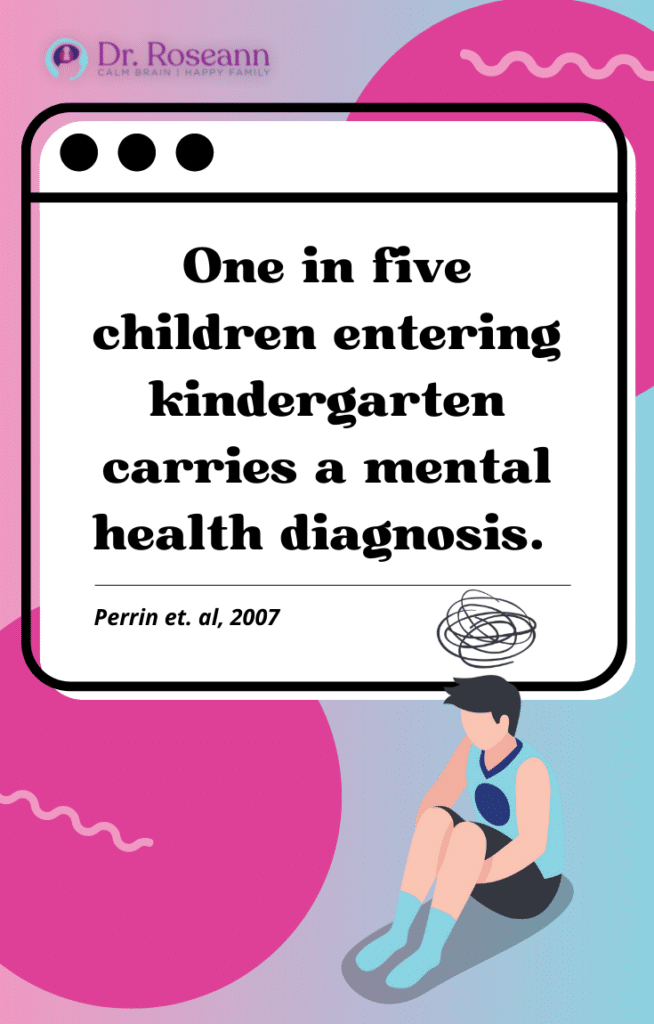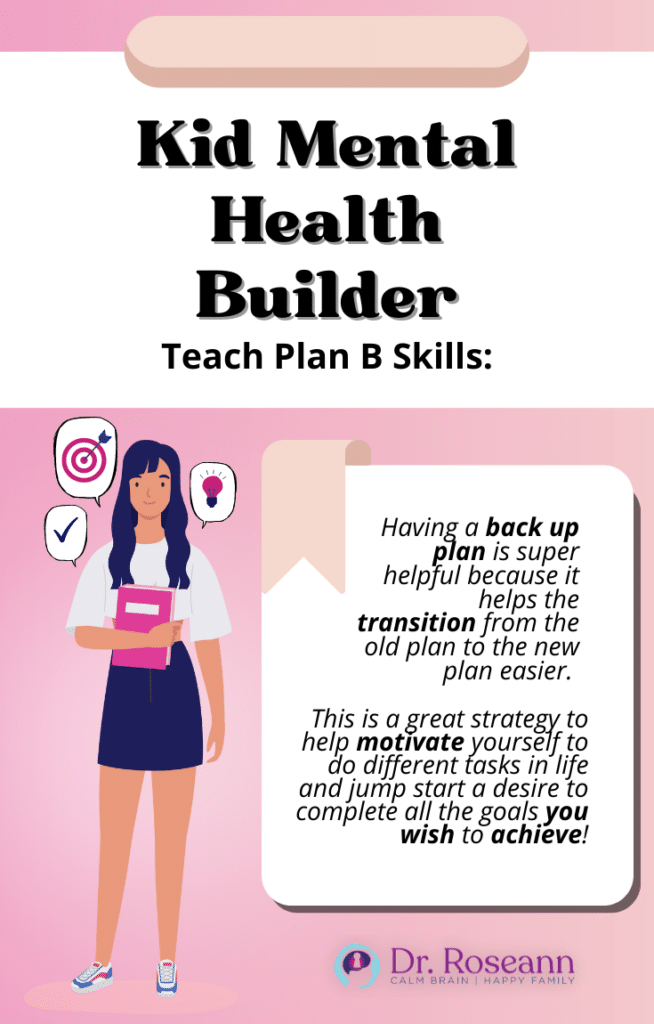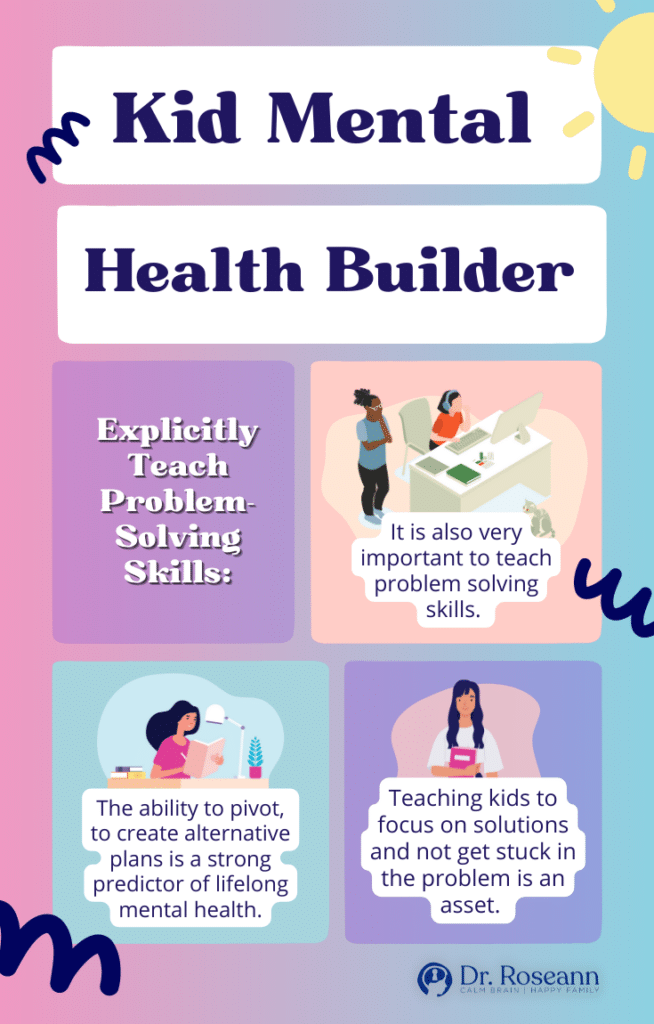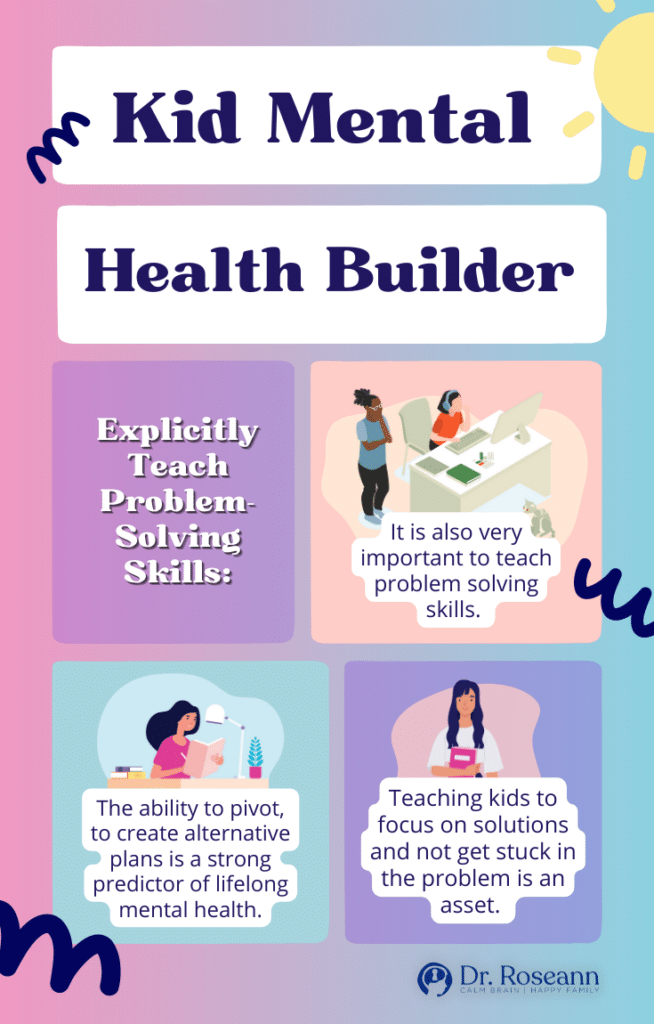Anxiety, OCD, and depression are prevalent mental health issues in today's society. In our pandemic world, it seems as though no one is immune from mental health struggles. Unfortunately, mental health issues amongst children and teens have been on the rise for a long time.
This rise in children's mental health issues is what prompted me to start The Global Institute of Children's Mental Health in January 2020. Kids are struggling and parents don't have good science-backed resources available to them. That is what my work is all about.
Here are some startling children's mental health statistics:

Nearly one in three adolescents (31.9%) met the criteria for an anxiety disorder.
National Survey of Children's Health
19.1 of adolescents have a behavioral disorder.
National Survey of Children's Health
One in five children entering kindergarten carries a mental health diagnosis.
Perrin et. al, 2007
The suicide rate among people ages 10 to 24 years old climbed 56% between 2007 and 2017.
Centers for Disease Control and Prevention
22.2% of American youth will have a diagnosable mental illness with “serious impairment” at some point before they are 18.
Child Mind Institute Children's Mental Health Report
What Can Parents Do To Support Their Child's Anxiety, OCD, and Depression?
With kids' clinical mental health issues on the rise, parents are at a loss to support them. They ask for school support and help from their pediatricians, yet mental health issues are not only increasing but the complexity of issues is deepening.
According to The Child Mind Institute Children's Mental Health Report, 22.2% of American youth will have a diagnosable mental illness with “serious impairment” at some point before they are 18. That means almost one-quarter of kids under age 18 will have a significant mental health issue that is affecting their daily functioning.
Kids' issues such as mood disorders and anxiety are often missed, especially when kids can mask their issues and do well in school. According to NAMI (2019) it takes on average 11 years from the start of a problem before someone gets proper help.
I do what I do because everyday we delay a child or teen getting mental health help, is another day that they and their families are suffering. That isn't okay!
You know I am all about solutions and that means there is something we can do to help our kids.
So how do we help our kids combat depression, anxiety and OCD? It all starts from within. How we parent has a direct causal link on our kid's mental health. When we engage in autonomy supportive parenting we help our kids build all those important mental health skills: coping skills, resilience, and grit.
When kids learn how to problem solve and that builds a positive mindset and helps them self-regulate. And one's mindset plays a major role in mood, stress tolerance, and self-concept. Inflexible and rigid thinking is a major obstacle to kids' mental health. Inflexible thinking always leads to behavioral challenges and rigid thinkers are hard to parent.
And dysregulated kids struggle with flexible thinking and stress tolerance. While our own self-regulation helps them to co-regulate, they need problem-solving and coping skills too.
As parents, we can tweak how we parent because there are practical ways to promote healthy thought patterns! That means our kids feel good about themselves and know how to deal with whatever life throws at them. Cognitive flexibility can be learned and when we reduce inflexibility, we have happier families.
Parenting Techniques to Reduce Rigid Behaviors and Inflexible Thinking
#1 Build a Growth Oriented Mindset
An important idea to remember is that having a positive mindset is great, but having a growth mindset is even more important. What is a growth mindset? Well one definition states that it is, “a belief that construes intelligence as malleable and improvable” (Ng, 2018).
Simply put, a growth mindset means a person's way of thinking in which a person's intelligence, talents, skills, and ways of doing things can be improved through passion and hard work. Everyone has an ability to change and improve, you just have to think you can.
A growth oriented mindset allows individuals to face challenges and put effort into learning new ideas. It not only fosters problem solving and positive thinking, it also encourages creativity too. Adopting a growth mindset can help kids with mood issues, autism, and other challenges. When kids learn to challenge themself and focus on growth rather than perfection, they develop a positive mindset.
#2 Teach Plan B Skills

If plans are great, but what happens when there are last minute changes that throw a curveball to your day? Does this mean your whole day is ruined? Will I still be able to get everything done? These are all questions that are common people may ask when plans change and that is normal.
Having a back up plan is super helpful because it helps the transition from the old plan to the new plan easier.
Life can be intense and it is helpful to remember that even when things change, everything can still work out. Kids need to learn that it may not look how you initially planned, but your day does not have to take a nosedive.
When creating a new plan it is helpful to address possible places of conflict in the original plan. By looking ahead to plan out possible future issues you have already taken the tie to find solutions to them. This is a great strategy to help motivate yourself to do different tasks in life and jump start a desire to complete all the goals you wish to achieve!
#3 Explicitly Teach Problem-Solving Skills

Similarly to things not going as planned, it is also very important to teach problem solving skills. Sometimes things can't go as planned and you need the cognitive flexibility to think on your feet.
The ability to pivot, to create alternative plans is a strong predictor of lifelong mental health. If you don't view something as stressful, it won't be for you. Teaching kids to focus on solutions and not get stuck in the problem is an asset.
When your middle schooler can't log into their email to finish their homework, ask them how they think they can solve the problem. Don't rescue them and instead get them thinking about solutions.
There is still hope and situations will work out okay even with your plan B. Having problem solving skills can help ease your mind when all those worried questions start popping up again because you know you can figure things out on the fly.
#4 Accept What Can't Control, See Options, Make New Decisions
As much as control is helpful, it is impossible to control everything. Sometimes it feels like life would be so much easier if you could, but unfortunately that just isn't realistic.
Learning to accept responsibility for only what you can control is essential. It is exhausting to take responsibility for things out of your control because life can change at the drop of a hat. It is very helpful to look at the other available options and make new decisions from there.
Unnecessary blame can trigger thoughts of depression. Therefore taking control of what you are responsible for is essential for warding off thoughts of depression.
#5 Combat Cognitive Distortions
Cognitive distortions are “internal mental filters or biases that increase our misery, fuel our anxiety and make us feel bad about ourselves” (Grinspoon, 2022). Unchecked, these cognitive distortions can influence a depressive, negative mentality and make behavioral and mental health symptoms worse. Many dsyregulated kids are prone to these kinds of distortions.
If a child or teen isn't accurately perceiving a situation, it is a challenge to deal with their behavior. When Matt was in constant conflict with his sister, he would just get so stuck because he misperceived every communication from her as a criticism. Care was taken to address his faulty perceptions and gradually Matt's behavior improved.
Flexible thinking is helpful because it can minimize these cognitive distortions. Flexible thinking is the opportunity to have an open-mind and adapt to new learning methods (Barak and Levenberg, 2016). Having an open mind will help individuals create positive mental connections and thereby reduce negative ones .
#6 Build Coping Strategies
Building coping skills is one of the best investments in a child's mental health and future success that a parent can make. When kids know they have the ability to solve problems, they feel confident in making their own decisions.
One type of therapy addresses the connection between how we think and behave. CBT stands for Cognitive Behavioral Therapy and is a treatment for depression. A focus of CBT is that it aims to correct faulty thought and unhelpful patterns of behavior. Building coping strategies are also a strong component of CBT. This type of therapy has had great success in research and is a great treatment avenue rather than just depression medication (APA).
Shifting your language from always accomodationg their upset or stress to reinforcing how they coped with something uncomfortable, is how parents can build coping skills. For example, when your teen is upset because their brother ate the last taco, ask them, “Ok, I think you cooked yesterday. What can you make today?” You don't have to overly comfort them or run in and make something. You want to foster thinking skills and the confidence to do things on their own.
#7 Create a Flexible Brain
When we use brain technology such as neurofeedback and PEMF to calm the brain, we create a flexible brain that can pay attention, learn, and take better action.
Neurofeedback is a great tool that we use here everyday at our center. Neurofeedback helps symptoms associated with behavioral, anxiety, mood and depression because it can calm our nervous system and get us out of that under or overstimulated state. It is a powerful way to calm that limbic, dsyregulated brain.
Oftentimes with mood and behavioral issues, we see people experience sluggish or agitated states. With neurofeedback, the edge can be taken off these symptoms and people can start to make improvements in their everyday life.
#8 Train Executive Functioning Skills

Executive functioning is a set of meta-cognitive or thinking skills that help us to plan and prioritize for some future event or task. Kids and teens with good executive functioning, know how to independently manage tasks, social relationships, and stress.
Executive functioning skills develop over time and can be directly taught. While some kids are better problem-solvers than others, executive functioning starts with behavioral response inhibition. That is just a fancy word for putting the brakes on when you need to.
If kids can't behaviorally self-regulate, then they can't get to high level tasks such as writing, strategic problem solving, etc. So, parents should focus on working on self-regulation and impulse control first. Then next teach those higher level skills.
#9 Get Them Laughing
A sense of humor can do a world of good in defusing a lot of stressful situations. When kids get stuck, being sarcastic can snap kids out of it. When I see a bubble of frustration, I love to tease my kids and ask them if Bruce Banner is there or the Hulk is coming out. It has become something that instantly creates laughter.
It is hard to be angry and rigid when we laugh. Not only does laughter promote feel good brain chemicals, it makes kids and teens reset their minds. They can let go of frustration and put their problem-solving thinking caps on. Even our most overly emotional, dsysregulated kids can learn to laugh over time.
#10 Let Them Know in Advance
When you let kids know what lies ahead of them, they can have time to adjust and plan. Many special needs kids or kids with clinical issues need to know the plan in advance. Previewing can greatly reduce anxious worries.
Previewing upcoming events and tasks also gives kids an opportunity to independently prepare for the task at hand. I always like to give my kids extra time to get things together instead of jumping in and doing things for them.
For example, instead of packing their bag for your family trip, ask them the week before what they think they need. It gives them control, fosters executive functioning and reduces stress for you and your child.
#11 Give Them The Opportunity to Make Choices
Kids need to learn to be divergent thinkers and that means they need opportunities to make their own choices. When we allow our kids to make choices, they build independent thinking skills.
It also gives them a way to safely have control over their environment. Many rigid kids say no to everything because they need control. Give kids two choices to reduce overwhelm and promote success.
Citations:
American Psychological Association. (n.d.). What is cognitive behavioral therapy? American Psychological Association. Retrieved July 6, 2022, from https://www.apa.org/ptsd-guideline/patients-and-families/cognitive-behavioral
Barak, M., & Levenberg, A. (2016). Flexible thinking in learning: An individual differences measure for learning in technology-enhanced environments. Computers & Education, 99, 39–52. https://doi.org/10.1016/j.compedu.2016.04.003
Child Mind Institute (2015). Children's Mental Health Report. https://childmind.org/awareness-campaigns/childrens-mental-health-report/
Merikangas, K. R., He, J. P., Burstein, M., Swanson, S. A., Avenevoli, S., Cui, L., Benjet, C., Georgiades, K., & Swendsen, J. (2010). Lifetime prevalence of mental disorders in U.S. adolescents: results from the National Comorbidity Survey Replication–Adolescent Supplement (NCS-A). Journal of the American Academy of Child and Adolescent Psychiatry, 49(10), 980–989. https://doi.org/10.1016/j.jaac.2010.05.017
Ng, B. (2018). The neuroscience of growth mindset and intrinsic motivation. Brain Sciences, 8(2), 20. https://doi.org/10.3390/brainsci8020020
Perrin, J. M., Bloom, S. R., & Gortmaker, S. L. (2007). The increase of childhood chronic conditions in the United States. JAMA, 297(24), 2755–2759. https://doi.org/10.1001/jama.297.24.2755
Always remember… “Calm Brain, Happy Family™”
Are you looking for SOLUTIONS for your struggling child or teen?
Dr. Roseann and her team are all about solutions, so you are in the right place!
There are 3 ways to work with Dr. Roseann:
You can get her books for parents and professionals, including: It’s Gonna Be OK™: Proven Ways to Improve Your Child’s Mental Health, Teletherapy Toolkit™ and Brain Under Attack: A Resource For Parents and Caregivers of Children With PANS, PANDAS, and Autoimmune Encephalopathy.
If you are a business or organization that needs proactive guidance to support employee mental health or an organization looking for a brand representative, check out Dr. Roseann’s media page and professional speaking page to see how we can work together.
Dr. Roseann is a Children’s Mental Health Expert and Therapist who has been featured in/on hundreds of media outlets including, CBS, NBC, FOX News, PIX11 NYC, The New York Times, The Washington Post,, Business Insider, USA Today, CNET, Marth Stewart, and PARENTS. FORBES called her, “A thought leader in children’s mental health.”

She is the founder and director of The Global Institute of Children’s Mental Health and Dr. Roseann Capanna-Hodge. Dr. Roseann is a Board Certified Neurofeedback (BCN) Practitioner, a Board Member of the Northeast Region Biofeedback Society (NRBS), Certified Integrative Medicine Mental Health Provider (CMHIMP) and an Amen Clinic Certified Brain Health Coach. She is also a member of The International Lyme Disease and Associated Disease Society (ILADS), The American Psychological Association (APA), Anxiety and Depression Association of America (ADAA) National Association of School Psychologists (NASP), International OCD Foundation (IOCDF) International Society for Neurofeedback and Research (ISNR) and The Association of Applied Psychophysiology and Biofeedback (AAPB).
© Roseann-Capanna-Hodge, LLC 2023
Disclaimer: This article is not intended to give health advice and it is recommended to consult with a physician before beginning any new wellness regime. *The effectiveness of diagnosis and treatment vary by patient and condition. Dr. Roseann Capanna-Hodge, LLC does not guarantee certain results.













